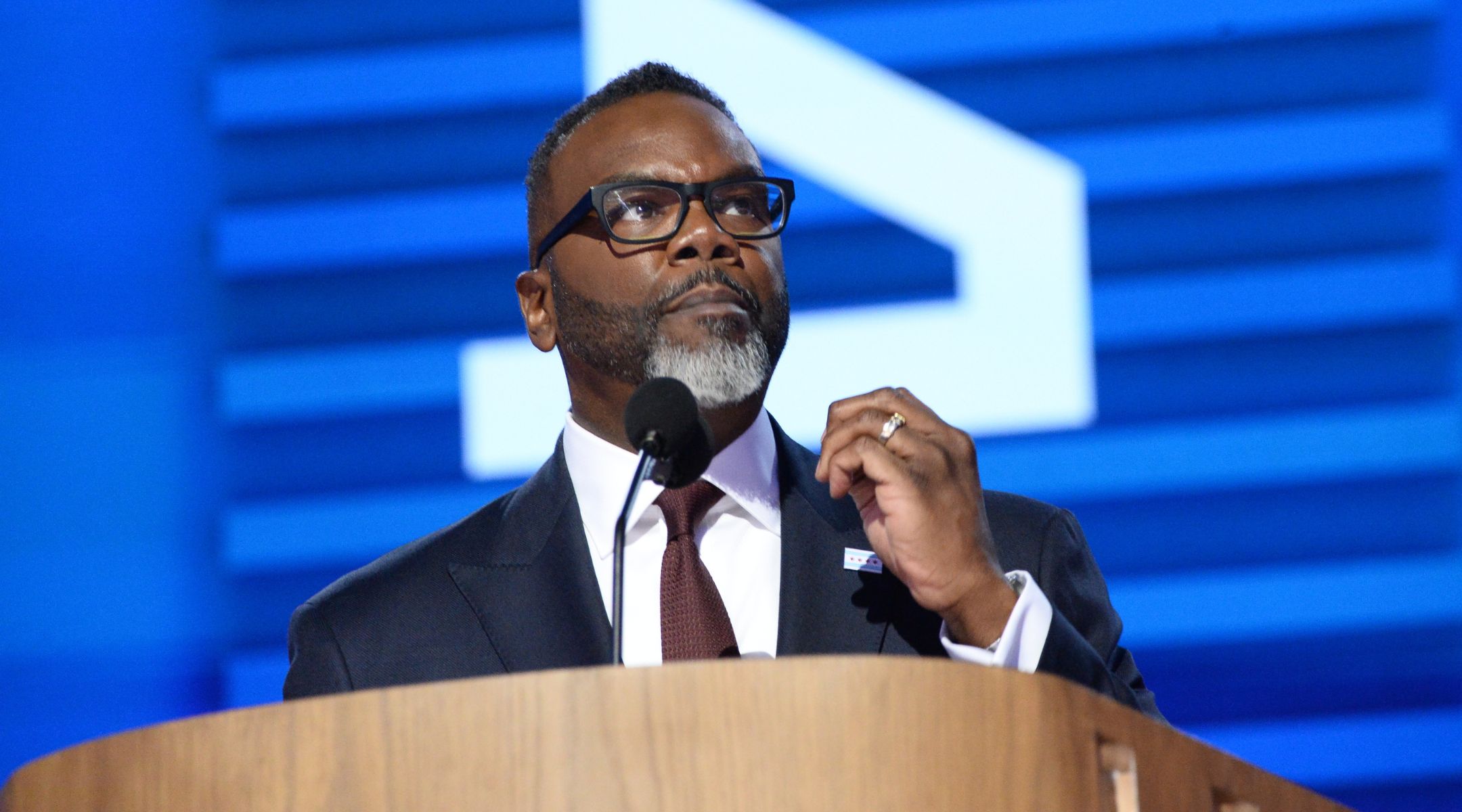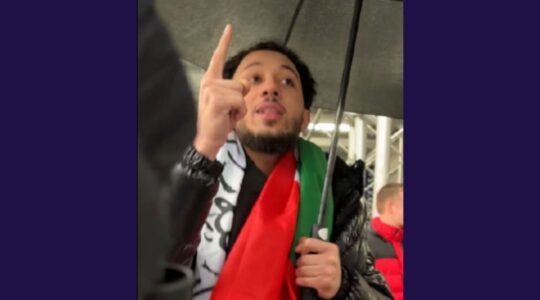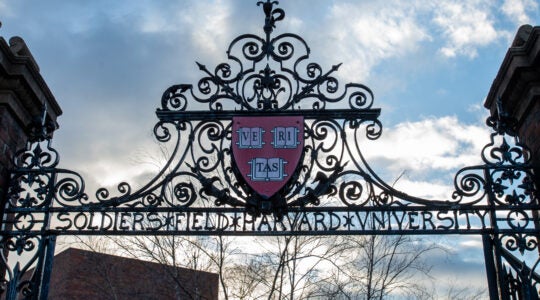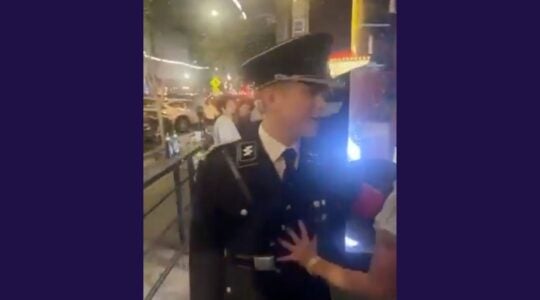Chicago Mayor Brandon Johnson condemned the shooting of an Orthodox Jewish man who was walking to synagogue, but drew blowback for not mentioning the victim’s Jewish identity.
Other political leaders have also condemned the shooting, which took place Saturday in the heavily Jewish neighborhood of West Rogers Park. The suspect, Sidi Mohamed Abdallahi, 22, then engaged in a shootout with police.
“On behalf of the City of Chicago, our heartfelt thoughts and prayers are with the victim and his loved ones from this weekend’s shooting incident that took place in Rogers Park,” Johnson wrote in a statement shared on X on Tuesday, adding that the “tragic event should have never happened.”
Abdallahi was charged with 14 felony counts, including attempted first-degree murder. But he has not been charged with hate crimes — drawing criticism from some local Jews.
Debra Silverstein, who represents the area in the City Council, chided Johnson for omitting the victim’s Jewish identity.
“The victim was a Jewish man, who was wearing traditional Jewish garb, walking to a Jewish place of worship on the Jewish day of rest,” Silverstein responded on X. “Don’t erase his identity and don’t try to minimize the fear and anxiety my community feels after this attack. We’re scared and we need to know that our mayor has our back.”
The local Jewish Community Relations Council denounced the statement as well, posting, “What will it take for you to acknowledge the Jewish community?”
Johnson also took heat for waiting until Tuesday to condemn the shooting.
The criticism marks the latest chapter in his rocky relationship with local Jewish leaders. In January, Johnson cast the tie-breaking vote to pass a resolution in the city council calling for a ceasefire in Gaza, making Chicago the largest U.S. city to do so. The resolution drew rebukes from local Jewish groups, including Chicago’s federation and the local branch of the Anti-Defamation League. Ahead of this summer’s Democratic National Convention in Chicago, Johnson called the war in Gaza “genocidal.”
This week’s criticism extended beyond Chicago. Rep. Ritchie Torres of New York, a staunch pro-Israel advocate, also called Johnson out.
“Why not mention WHY the victim was shot (because he was Jewish)? Why not mention WHERE the victim was shot (en route to a synagogue)?” Torres wrote on X. “Any Mayor who cannot be bothered to acknowledge the antisemitism of a hate crime against a Jewish man heading to a synagogue is unworthy of the office he holds.”
Gun violence is common in Chicago — a tracker from a local ABC affiliate shows almost daily shootings — but the nature of this incident has drawn particular attention. Illinois’ Jewish governor, J.B. Pritzker, released a statement on Wednesday that referenced a potential antisemitic motive.
“I am deeply troubled by the shooting of an Orthodox Jewish man as he walked to his synagogue in West Rogers Park on Saturday,” Pritzker wrote. “I pray for the victim, his family, and our entire Orthodox Jewish community, and I support all efforts by law enforcement to investigate and prosecute this senseless act of violence.”
Pritzker continued, “The motivation of the shooter deserves a complete and thorough examination to determine if this should additionally be charged as a hate crime.”
Illinois Sen. Dick Durbin, a member of the Democratic leadership in the Senate, also referred to the recent rise in antisemitism in his own statement.
“This attack on a Jewish man in Chicago during the Jewish holidays is unacceptable,” Durbin wrote on X. “Antisemitism is on the rise in America, and we must remain laser-focused on rooting it out. I stand with the Jewish community in Chicago and across the country.”
Abdallahi was due in court Tuesday, but missed the appearance because he remains in the hospital. He is now expected to appear Nov. 7. The victim, 39, was released from the hospital on Saturday.
Chicago Police Department Superintendent Larry Snelling, as well as some Jewish leaders, have urged patience on the hate crimes designation as the investigation continues.
“There’s been a lot of information circulating about the shooting, and we ask that the public not rush to judgment in this situation,” Snelling said at a press conference Monday. “We’re continuing to investigate based on the facts and evidence available.”
He added, “We don’t just go in and assume that everything is a hate crime, but what we don’t do is rule out the possibility that it could be.”
One sticking point for many has been footage captured on a nearby security camera that appeared to show Abdallahi shouting “Allahu akbar,” or “God is the greatest” in Arabic. According to police, the comment was made during Abdallahi’s engagement with police, not during his attack on the Jewish victim.
“The statement that was made while he was engaging our officers is nothing that we could bring in as evidence at this point that would support any motive against his actions towards our officers as well as towards our victim,” Chief of Detectives Antoinette Ursitti said at the press conference.
Regardless of the charges, Jewish leaders say the shooting rattled a Jewish community that was already on high alert.
“Saturday’s crime feels like a hate crime,” David Goldenberg, the Midwest regional director for the Anti-Defamation League, said at a Tuesday press conference with local Jewish leaders. “Regardless of where the investigation lands, Chicago’s Jewish community has been rocked. And Saturday’s shooting is just the latest.”
JTA has documented Jewish history in real-time for over a century. Keep our journalism strong by joining us in supporting independent, award-winning reporting.






